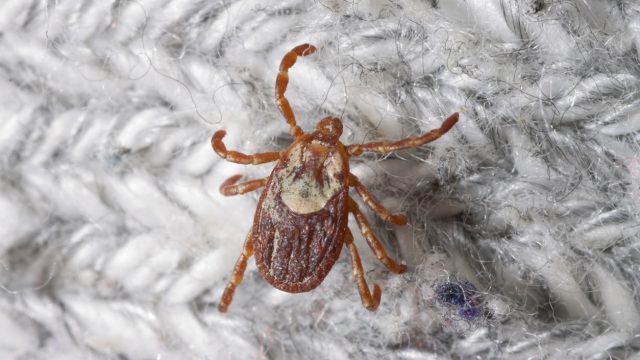CDC Issues New Warning for Deadly Tick-Borne Disease—These Are the Symptoms
The agency says three people have died from Rocky Mountain spotted fever after recent travel.

Considering how small they are, it's ironic how much of a grave danger ticks can pose to our health. The minuscule bugs can stealthily cling to our clothing when we spend time outdoors before they bite into our skin, potentially spreading pathogens that can cause severe illness, including Lyme disease, babesiosis, ehrlichiosis, and more, according to the National Institute for Occupational Safety and Health (NIOSH). But now, the Centers for Disease Control (CDC) has issued a new warning in the wake of an outbreak of Rocky Mountain spotted fever (RMSF), a deadly tick-borne disease.
RELATED: Deadly Salmonella Outbreak Spreading in 34 States—These Are the Symptoms.
According to the agency, there's been a recent uptick in RMSF cases in the U.S. As of Dec. 8, five people have been diagnosed with the disease since late July. In each case, those who were infected had traveled to Tecate, Mexico, within two weeks of becoming ill. All of the patients—including four of whom were under the age of 18—were hospitalized in southern California, and three died from the disease.
The CDC described RMSF as a "severe, rapidly progressive, and often deadly disease transmitted by the bite of infected ticks," although many who become infected never notice a tick bite on their body. It's endemic to parts of the southwestern U.S. and areas of northern Mexico, where it's typically spread by brown dog ticks (Rhipicephalus sanguineus) commonly found on pets. However, it's still reported throughout the U.S., with the most common states listed as North Carolina, Tennessee, Missouri, Arkansas, and Oklahoma.
The agency says that RMSF is a "rapidly progressive" disease that can become fatal if not treated with antibiotics within days of symptoms starting. Unfortunately, they can often present as "mild and non-specific" for their first four days before becoming more severe. The CDC notes that half of all patients who die from RMSF do so within eight days of the first signs of illness, and it is five times more fatal in children under the age of 10.
Because early detection is vital in preventing a tragic outcome, the CDC suggests the public keep a close eye out for any signs of the disease—especially if they've traveled to regions where it's prevalent or have been around tick-infested dogs. Read on for the symptoms of Rocky Mountain spotted fever you should know about.
1
Fever and Headache

According to the CDC, fever and headache are two of the earliest symptoms of RMSF. Unfortunately, they're also non-specific to the disease, meaning they could easily be mistaken for something else, such as a common cold or the flu.
RELATED: 16 States Where Respiratory Illness Is Spreading Fast, CDC Warns.
2
Rash

As the "spotted" in its name suggests, rashes are a common symptom of RMSF that typically develops on the arms or lower extremities two to four days after the onset of fever. According to the CDC, its appearance can vary widely over the course of illness. The agency notes that "some rashes can look like red splotches and some look like pinpoint dots."
However, the relatively late onset of the symptom can make it hard to pinpoint the disease in its earliest days. And while it's common in "almost all patients," some never develop the rash.
RELATED: Doctor Reveals COVID Symptoms in Patients Who Haven't Gotten a Fall Booster.
3
Stomach Issues

While not exclusive to RMSF, stomach issues are also common symptoms of the disease. The CDC says they include nausea, vomiting, stomach pain, and lack of appetite.
RELATED: FDA Warns Common Soda Ingredient Is Toxic to Your Thyroid.
4
Muscle Pain

Feeling stiff or achy can come with many illnesses, but it's also common for RMSF. According to the CDC, it can be one of the symptoms of the tick-borne disease.
Best Life offers the most up-to-date information from top experts, new research, and health agencies, but our content is not meant to be a substitute for professional guidance. If you have health questions or concerns, always consult your healthcare provider directly.
RELATED: For more up-to-date information, sign up for our daily newsletter.
- Source: The National Institute for Occupational Safety and Health (NIOSH): Tick-Borne Diseases
- Source: CDC: Severe and Fatal Confirmed Rocky Mountain Spotted Fever among People with Recent Travel to Tecate, Mexico
- Source: CDC: Rocky Mountain Spotted Fever (RMSF) Transmission
- Source: CDC: Rocky Mountain Spotted Fever (RMSF) Signs & Symptoms





















